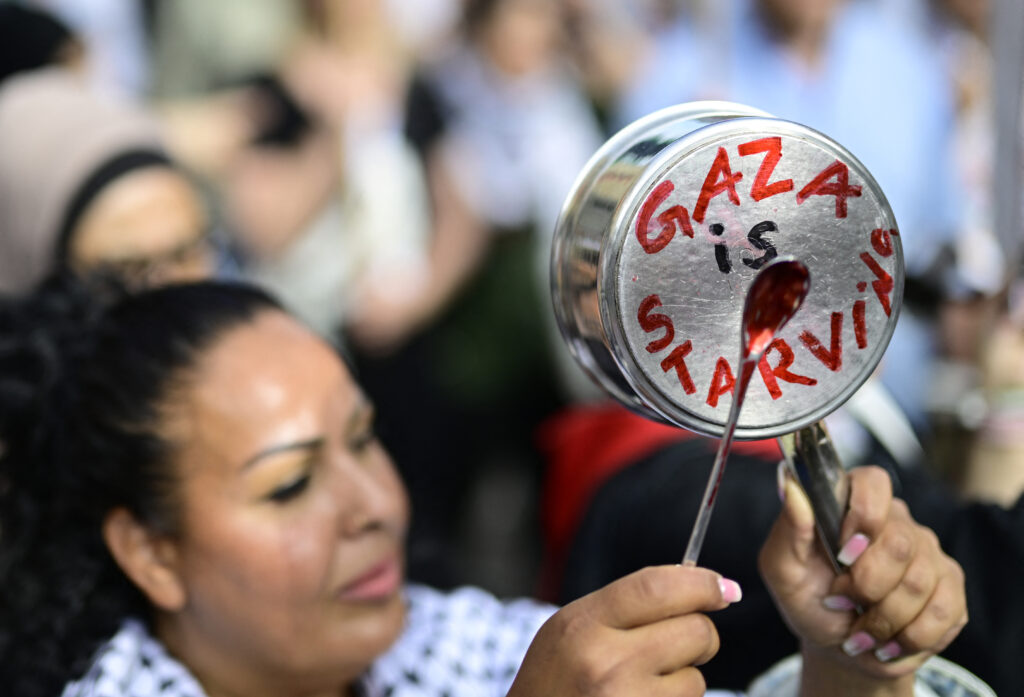Activists accusing Egypt of refusing to let aid into the Gaza Strip amid a mounting starvation crisis in the Israeli-blockaded territory have launched protests at Egyptian embassies around the world.
From Sweden, Ireland, the UK, Spain and Finland to South Africa, Libya and Turkey, a string of protests has erupted worldwide demanding Cairo “break the siege” by opening the Rafah crossing to allow aid into the besieged Palestinian enclave.
The movement began on 21 July, when 27-year-old Egyptian activist and content creator Anas Habib chained shut the entrance to the Egyptian embassy in the Netherlands in a solo protest.
Live-streaming the event, he said that if Egypt keeps the Rafah crossing closed, then its embassies will remain closed “until Gaza opens”.
“For two years, they’ve participated in their [Palestinians’] killing and starvation… lying to the poor people who live there, telling them: ‘No, the crossing is closed from the [Israeli] side, not from ours,” he said in his video.
New MEE newsletter: Jerusalem Dispatch
Sign up to get the latest insights and analysis on
Israel-Palestine, alongside Turkey Unpacked and other MEE newsletters
Two days later, new protesters locked the same embassy again.

‘If Egypt is free, Gaza will be free,’ says activist who locked Cairo embassy
Read More »
Soon after, activists around the world followed suit, using metal chains and locks at the entrances of Egyptian embassies.
At least 154 Palestinians, including 89 children, have died from malnutrition, according to Palestinian health officials.
On Tuesday, the Integrated Food Security Phase Classification (IPC), the world’s leading hunger monitoring body, warned that the “worst-case scenario of famine” is unfolding in Gaza due to the Israeli-imposed starvation.
“Latest data indicates that famine thresholds have been reached for food consumption in most of the Gaza Strip and for acute malnutrition in Gaza City,” the UN-backed experts warned.
Global protests
In London, protesters gathered outside the Egyptian embassy on 26 July, banging pots and pans to symbolise the mass starvation in Gaza.
They called on the government to “break the siege” and allow the flow of humanitarian aid.
“Send in the aid. Stop starving the Gazans,” said one protester.
Others at the demonstration locked the embassy with a wooden stick and marked the walls with red handprints.
In Pretoria, South Africa, protesters spray-painted “[Egyptian President Abdel Fattah el-]Sisi is a traitor” on the outer wall of the embassy on 29 July.
“Sisi sold Gaza,” they chanted.
Social media users weighed in to extend their support to the demonstrators.
“It’s amazing to see people come together for a cause and put pressure on people to make things happen,” one user said regarding the London protesters.
Another user wrote: “Sisi’s role in keeping Rafah closed makes him complicit in Gaza’s suffering. When borders are weaponized and people starve, it’s not just a siege on Gaza, it’s a betrayal of regional solidarity and human decency.”
Last week, Egypt condemned “unjustified accusations” that it is contributing to the siege of the Gaza Strip, calling it a “malicious propaganda campaign”.
In a statement released by the Ministry of Foreign Affairs, Cairo said that “Rafah has remained open from the Egyptian side. Israeli forces control the Palestinian side and block access”.
In June, Egyptian authorities detained nearly 200 activists who arrived in the country to participate in the Global March to Gaza, an international action intended to break Israel’s siege of Gaza and pressure the international community to force Israel to end its assault on the strip.


